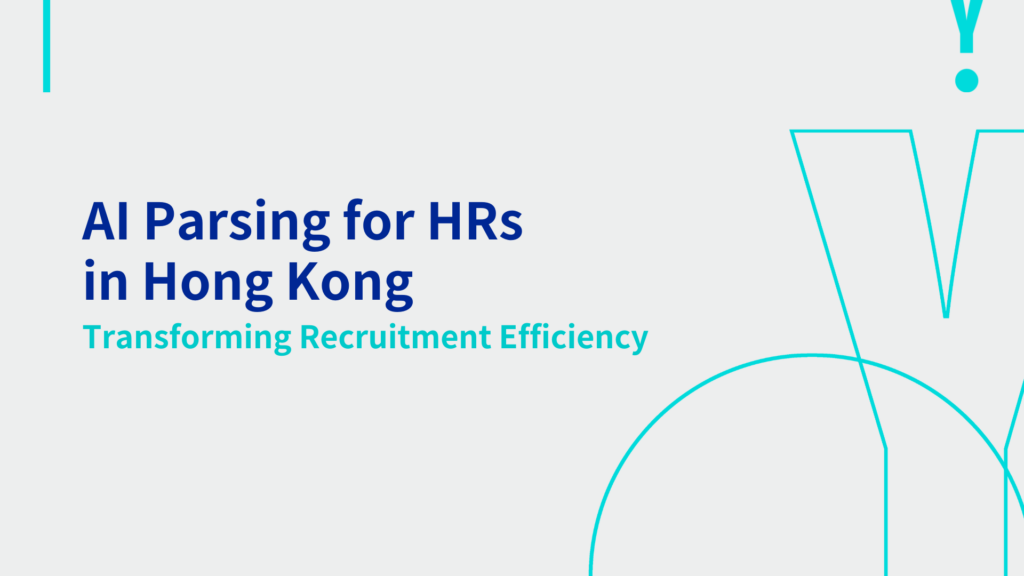
HR teams continuously struggle with excessive volumes of candidate data in the fast-paced employment landscape of today. Sorting resumes, analyzing qualifications, and matching skills with requirements often become time-consuming, error-prone tasks. Manual screening drains valuable time, delays hiring decisions, and risks overlooking qualified candidates.
However, AI parsing technology is now transforming recruitment by automating data extraction and interpretation. With AI-driven parsing, an HR in Hong Kong can instantly process resumes, identify key skills, and match applicants with specific job profiles. Therefore, this speeds up recruitment, ensures consistency, and improves candidate quality.
For businesses striving to compete for top talent, ignoring AI parsing could mean falling behind. By integrating this technology, HR departments can optimize workflows, save costs, and make better hiring decisions.
So, let’s explore how AI parsing works, why it benefits HR teams, and how to implement it effectively without disrupting existing systems.
What is AI Parsing in HR?
AI parsing is the automated extraction and structuring of relevant information from unstructured documents like resumes, CVs, and cover letters.
This technology generally uses Natural Language Processing (NLP) and Machine Learning (ML) to understand document content beyond simple keyword matching. Rather than reading every resume manually, AI parsing instantly converts raw text into structured, searchable data for easy analysis.
For HR teams, this means faster candidate screening, fewer errors, and improved accuracy in matching applicants to open positions. Additionally, AI parsing enables better compliance with record-keeping and reporting requirements in recruitment.
Therefore, by automating repetitive administrative work, HR professionals can focus on higher-value tasks like interviewing and employee engagement.
Why Businesses Need AI Parsing in HR in Hong Kong?
Recruitment has shifted dramatically due to the growing competition for skilled professionals. Businesses can no longer rely solely on manual screening processes. They start to consider HR software that fits their requirements.
Here are the core reasons AI parsing is becoming essential for HR departments across industries:
- Speed of Hiring: AI parsing processes hundreds of resumes within minutes, reducing time-to-hire and increasing competitiveness.
- Accuracy in Matching: By analyzing context and experience, AI matches candidates with far greater precision than manual reviews.
- Cost Reduction: Automation cuts down administrative hours, thus lowering recruitment overhead costs significantly.
- Consistency in Screening: Eliminates human bias in the initial screening process, consequently ensuring fairness across all applications.
- Scalability: Easily handles large recruitment drives without overloading HR staff or compromising quality.
For growing businesses, these benefits are critical in attracting and retaining the right talent.
How AI Parsing Works in The HR Process?
Understanding the workflow of AI parsing helps businesses, especially HRs in Hong Kong, maximize their impact. Here is the typical process:
- Document Collection: Resumes and related documents are collected through job portals, emails, or applicant tracking systems (ATS).
- Data Extraction: AI algorithms identify and extract key details like name, contact information, skills, and work history.
- Data Structuring: Extracted information is converted into a structured format suitable for storage and analysis.
- Skill Matching: AI compares candidate skills and experiences with job descriptions for optimal alignment.
- Ranking Candidates: Applicants are scored and ranked based on relevance, experience, and matching criteria.
- HR Review: The final shortlisting is provided to HR professionals for human decision-making.
This combination of automation and human judgment ensures both efficiency and quality in hiring decisions.
Key Features of AI Parsing Solutions for HR
When choosing AI parsing tools, businesses should look for features that maximize efficiency and accuracy. Common capabilities include:
- Multi-format Support: Ability to parse PDF, Word, TXT, and image-based resumes with OCR technology.
- Contextual Understanding: NLP-driven recognition of job titles, skills, and industry-specific terminology.
- Integration Compatibility: Seamless connection with existing ATS as well as HRIS platforms.
- Customizable Filters: Tailored screening criteria based on business-specific requirements.
- Data Privacy Compliance: Adherence to GDPR, HIPAA, or other relevant data protection regulations.
- Multilingual Parsing: Support for global recruitment processes across different languages.
These features ensure that AI parsing tools meet diverse HR needs without creating integration issues.
Real-World Benefits of AI Parsing for HR Departments
Businesses adopting AI parsing experience noticeable improvements in both hiring speed and quality. Here’s how the benefits translate in practice:
- Reduced Screening Time: HR staff can focus on candidate engagement instead of manual data entry.
- Improved Candidate Experience: Faster responses enhance the company’s employer brand reputation.
- Data-Driven Decisions: Structured candidate data enables advanced analytics, informed hiring strategies, and HRs in Hong Kong.
- Lower Turnover Rates: Better candidate-job fit reduces employee churn.
- Greater Diversity in Hiring: Bias-free initial screenings open opportunities for underrepresented candidates.
Hence, these outcomes strengthen recruitment pipelines and contribute directly to business growth.
Challenges in Implementing AI Parsing in HR
While AI parsing offers significant benefits, implementation can present challenges if not planned carefully. Common obstacles include:
- Integration Complexity: Existing HR systems may require customization to connect with AI parsing tools.
- Staff Training Needs: HR professionals must learn to interpret AI-generated data effectively.
- Cost Considerations: Advanced parsing solutions may require upfront investment before delivering ROI.
- Data Security Concerns: Candidate data must be handled according to strict privacy regulations.
Addressing these challenges early ensures a smoother transition to automated recruitment processes.
Best Practices for Adopting AI Parsing in HR
To successfully implement AI parsing, businesses should follow these proven best practices:
- Conduct A Needs Assessment: Understand your hiring volume, complexity, and specific automation goals.
- Choose A Scalable Tool: Select software capable of growing with your business and handling varied recruitment needs.
- Integrate Gradually: Start with a pilot program to test the system and identify necessary adjustments.
- Train HR Teams: Ensure staff understand how to use AI-generated insights effectively.
- Maintain Human Oversight: Use AI-based HR software for parsing as a decision-support tool, not a full replacement for human judgment.
- Monitor & Optimize: Continuously review performance metrics to refine AI parsing processes.
Future of AI Parsing in HR Departments
AI parsing technology is evolving rapidly, thus offering increasingly sophisticated capabilities for HR departments. Future developments may include:
- Enhanced Predictive Analytics: Forecasting candidate success based on historical hiring patterns.
- Real-Time Parsing: Instant extraction during live interviews or application submissions.
- Voice And Video Parsing: Automated transcription and analysis of candidate interviews.
- Deeper Sentiment Analysis: Understanding candidate tone and intent beyond resume content.
These advancements will make recruitment faster, smarter, and more precise than ever before.
Making AI Parsing A Competitive Advantage
AI parsing is no longer a futuristic concept; it’s a practical, powerful tool that can transform HR efficiency and hiring quality. Therefore, by adopting AI parsing, an HR in Hong Kong can process applications faster, match candidates more accurately, and maintain consistent, unbiased screening processes.
Although implementation requires careful planning, the long-term benefits in time savings, cost reduction, and improved recruitment outcomes are substantial. For businesses looking to gain a competitive edge in talent acquisition, integrating AI parsing into the HR process is a smart, future-proof investment.
Here, we at YOOV can help with our best AI-driven HR software solutions. So, if you want to integrate such a system solution at your office, especially for the HR department, contact us.
Connect with YOOV

WhatsApp:Click Here
Email:hello@yoov.com
Website:https://www.yoov.com/